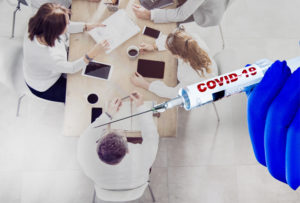Reopening the office: A guide for employers
 The New York State Department of Health and the U.S. Equal Employment Opportunity Commission (EEOC) have recently updated their guidelines for maintaining a safe workplace.
The New York State Department of Health and the U.S. Equal Employment Opportunity Commission (EEOC) have recently updated their guidelines for maintaining a safe workplace.
New York state updates
On June 8, the Department of Health issued its “Interim Covid-19 Guidance for Office-Based Work.” The guidance provides office employers with the discretion to lift many of the Covid-19 restrictions for fully vaccinated employees and simplifies reporting and notice requirements.
The guidance applies to commercial office settings which provide traditional business administration activities, including back office support, bookkeeping, business and financial management and professional services.
The guidance does not apply to medical offices, dental offices, building managers, public events or retail establishments catering to the public, such as restaurants. There are separate guidance documents for these activities.
Commercial work offices which meet the above description may choose to either continue requiring employees and patrons to wear masks and to maintain six feet of social distancing in the office, or forgo those requirements by adopting a policy in accordance with current Center for Disease Control guidance, which advises that fully vaccinated individuals do not need to wear masks or be socially distanced, but unvaccinated individuals must continue to wear masks and be socially distanced.
For businesses that do not congregate patrons or operate below the State”™s social gathering limit of 250 indoors or 500 outdoors, fully vaccinated individuals do not need to wear masks or be socially distanced, but unvaccinated individuals must continue to wear masks and be socially distanced.
Fully vaccinated is defined as having completed a Covid-19 vaccination series (two doses of Pfizer, two doses of Moderna or one dose of the Johnson & Johnson vaccine) 14 days before the individual”™s entry into the workplace.
Businesses may require proof of vaccination status through paper documentation, digital application or the use of New York State’s Excelsior Pass. Alternatively, businesses may rely upon an honor system based on self-reporting by the employee.
Screening requirements have also been reduced. Businesses may screen individuals entering the workplace by the use of signs, rather than questionnaires.
The required screening questions are modified and focus on three areas: whether employees have experienced Covid symptoms, whether they have had close contact with another person diagnosed with Covid or whether they have tested positive for Covid.
New York state”™s recent announcements also clarify that employees are entitled to paid sick leave for time away from the office to obtain a vaccine, and for time off to recover from any side effects of the vaccine.
U.S. Equal Employment Opportunity Commission guidance
On May 28, 2021, the United States Equal Employment Opportunity Commission updated its guidance for employer compliance with federal employment laws during the pandemic.
The EEOC guidance, in a simple question-and-answer format, advises employers on how to comply with disability, confidentiality, hiring, reasonable accommodation, harassment, family leave, furlough, age, pregnancy and vaccination issues during the pandemic.
Although all of those topics are too numerous to discuss in this column, the recent update includes new guidance related to vaccinations. According to it, private employers may require employees that physically enter the workplace (as opposed to remote workers) to be vaccinated against Covid-19.
In order to do so in compliance with the Americans with Disabilities Act, Title VII of the Civil Rights Act and other nondiscrimination laws, private employers must provide a “reasonable accommodation” for employees who choose not to be vaccinated due to disability, sincerely held religious beliefs or pregnancy.
The Guidance offers examples of reasonable accommodations which include, but are not limited to, requiring unvaccinated employees to wear a face mask, to work at a social distance from coworkers, to work a modified shift, to get periodic Covid-19 tests, to be given the opportunity to work remotely or to accept a reassignment of their work duties. The guidance cautioned employers that any mandatory vaccination program would need to be implemented in a manner designed to avoid disparate impact, or to avoid disproportionately excluding employees based on race, religion, gender, age or other protected classifications.
Documentation that an employee has or has not been vaccinated is considered personal medical information. It should be kept confidential and stored separately from the employee”™s personnel file. In addition, under the Americans with Disabilities Act, it is unlawful to disclose that an employee is receiving a reasonable accommodation based on a disability.
The EEOC guideline expressly disclaimed any opinion on the legal implications of employer-mandated vaccination of a substance approved as an Emergency Use Authorization by the Food and Drug Administration, the authorization for all Covid-19 vaccines.  Currently, there are lawsuits pending against employers in California, Texas, New Mexico and North Carolina, alleging that employees may not be compelled to take a vaccine approved by the FDA under the Emergency Use Authorization. I am not aware of any such litigation in New York.
If you have specific questions regarding compliance with current New York state or federal guidelines relating to the Covid-19 pandemic you may address them to me directly at jbuss@sbjlaw.com.